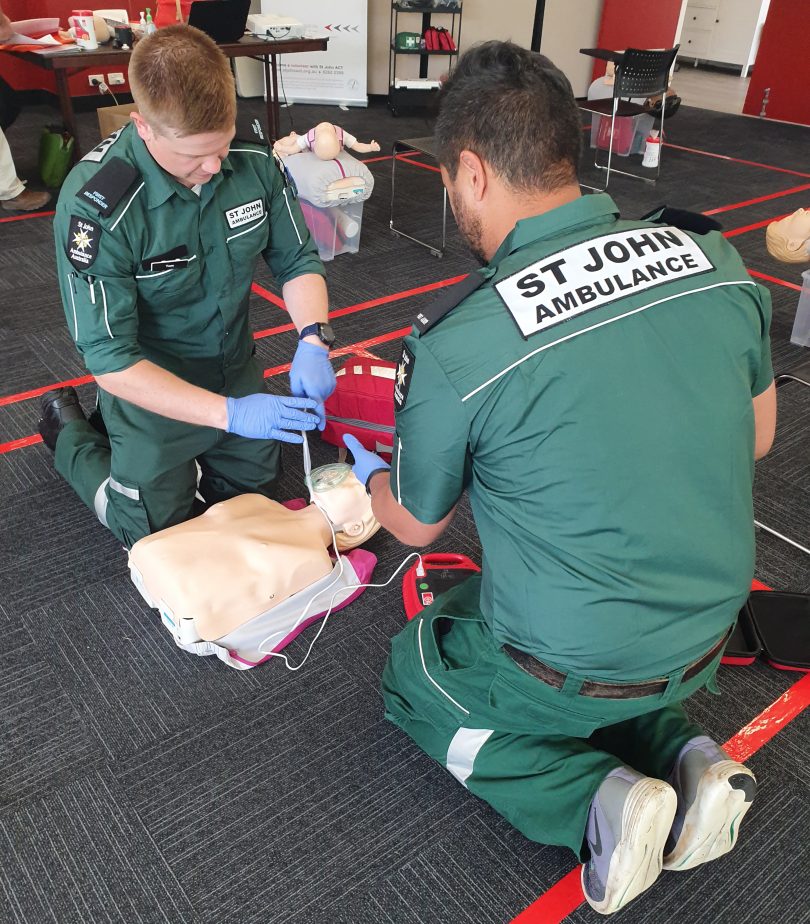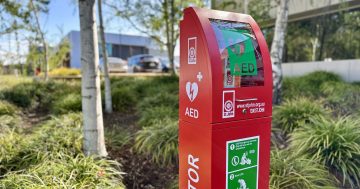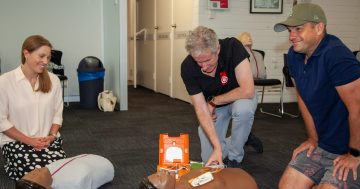
It’s no joke, but Tom Cressy and Jay Johnstone can share a laugh after Tom helped revive Jay from a sudden cardiac arrest. Photos: Throttle Media.
Jay Johnstone’s heart stopped beating for seven minutes as he lay unresponsive on the floor of a gym in Canberra. He is only alive today because of the quick-thinking of a volunteer with St John Ambulance who was able to restart the 31-year-old’s heart.
The life-defining moment came on 26 September last year.
“I remember feeling really short of breath and my heart was racing. We’d just been doing some interval sprints but my heart rate just kept spiralling higher and higher,” Jay tells Region Media.
“I started to faint and remember being in and out of consciousness and people around me were really concerned.”
One of the concerned people in the gym that day was Tom Cressy, a CPR-trained first responder with St John Ambulance, who noticed Jay lying in the recovery position.
“Jay was still responsive, then he became less responsive,” says Tom. “I was trying to feel his radial pulse but couldn’t. His pupils weren’t dilating. Within less than a minute, he was unconscious and his heart had stopped beating.”
Tom had someone call an ambulance, which had to be diverted from another job but was about 13 minutes away.
He asked someone to find a defibrillator machine but there wasn’t one in the gym. That person ran to a nearby Woolworths supermarket which was closed, but banged on the door hard enough to alert a store member to get their defibrillator.
“I know that every minute without a defib increases the chance of death by 10 per cent,” Tom says.
“I did CPR for about seven minutes and then was able to shock him with the defib for about three minutes. I was stuffed by that stage, so another guy took over. Then the ambos arrived.”
The training sessions he’d done with St John Ambulance in the previous six months gave him the confidence to know Jay was going to pull through.
It was all news to Jay. He remembers waking in an ambulance and being told he’d just had a sudden cardiac arrest. He also had a cracked rib from the CPR.

Tom Cressy and Jay Johnstone are both volunteers with St John Ambulance.
“There was never a doubt in my mind that he was going to die, but that’s really naive when you look at the statistics of people who have heart attacks,” Tom says.
Those statistics are that 34,000 Australians and New Zealanders suffer a cardiac arrest out of hospital and 80 per cent of those people die. After 10 minutes without intervention, the damage caused by cardiac arrest is nearly always irreversible.
To say Jay is grateful is an understatement. He says he is close to making a complete recovery but will be on medication for the rest of his life. He has also had heart surgery to install an internal defibrillator to control the condition called ventricular fibrillation that occurs when the heart beats with rapid, erratic electrical impulses.
“For me, it’s kind of like when a car cylinder misfires and my heart skips a beat which then spirals into lights out. It’s not good,” says Jay.
“The ambulance was never going to save me, so without the quality CPR and the defib, I could have been left with a severe brain injury at best.”
Jay and Tom are now good mates – and Jay is also a volunteer with St John – and they can’t stress the importance of doing the training with St John or having a defibrillator close by.
“I was very unlucky but I was so lucky as well,” says Jay. “These sort of things shouldn’t happen, but it happens to one-in-five people in Australia, so if you work with 10 people, two of them could have a heart attack.”
World Restart a Heart Day was on 16 October. It’s a global initiative to raise awareness and educate the community about CPR and defibrillators in the community. To find out more, visit the Council of Ambulance Authorities, get in touch with St John Ambulance in Canberra, and watch the video with Tom and Jay about how to restart a heart.














